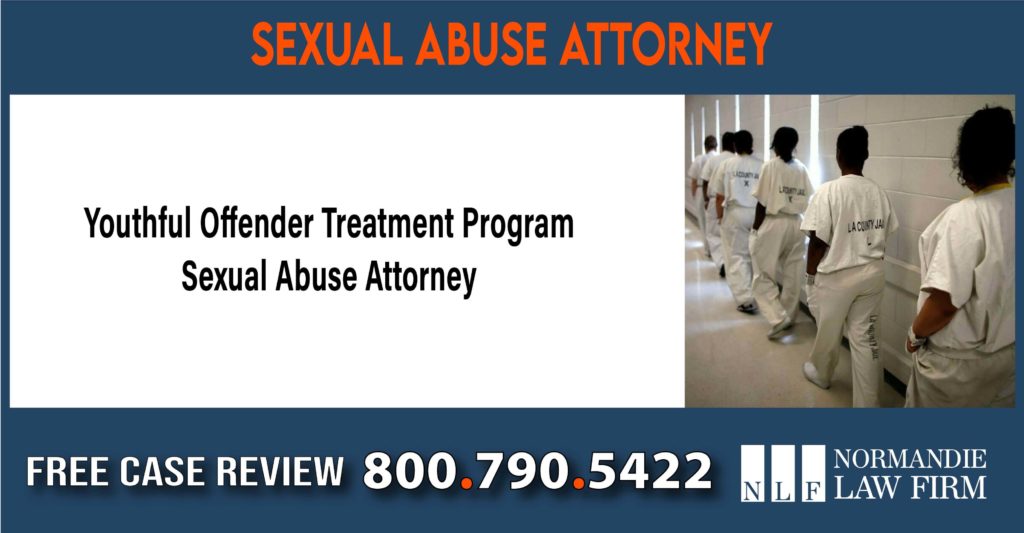Were you sexually assaulted by a parole officer while you were enrolled in California’s Youthful Offender Treatment Program? Were you sexually abused at a juvenile hall by a probation officer, counselor, or another employee prior to your release date? The sexual abuse of minors is grounds for a lawsuit, which can help you recover the losses you sustained through no fault of your own.
The Youthful Offender Treatment Program, or the CDCR Youthful Offender Program, is a parole eligibility system for the early release of youth offenders. A juvenile inmate must demonstrate that “he/she has been rehabilitated and gained maturity” to qualify for parole. This is a movement with strong support in California, where child welfare and rehabilitation are primary concerns. After all, most youths entering the system are misguided children, largely from abusive backgrounds. If it’s possible for them to turn things around and make a positive contribution to society, they should be given the chance to do so.
Unfortunately, the people who are supposed to help and supervise these children do not always enter the justice system with honorable intentions. Some of them are sexual predators that are looking for easy access to kids, and a juvenile hall or program is an ideal place for them to find such victims. The Youthful Offender Treatment Program abuse lawyers at our office understand the lifelong harm and devastation of childhood sexual abuse. We also understand the need to take back control from the people who have hurt you, which many people achieve by filing a Youthful Offender Treatment Program sexual abuse lawsuit.
If you would like more information on the right to sue for sexual abuse at a juvenile justice program, contact us as soon as possible.

Our Recent Verdicts and Settlements
$2.5 Million
$600,000
$1.5 Million
$54 Million
$525,000
$1.2 Million
Sexual Consent Laws in California
Many of the adult survivors that come to us have questions about the abuse they suffered, as they are unsure about the legal definition of child sexual assault. We can understand where the confusion comes from. Yes, some juvenile inmates are forced into a sex act by physical means, but many of them are groomed over a period of weeks, even months. This can be done by paying the child compliments, empathizing with their pain, and granting them special privileges
By the time things escalate to inappropriate touching, the victim is conflicted about how they should handle the situation. A female inmate, for example, may convince herself that a parole officer groping her breasts isn’t that big of a deal. And if she didn’t say no right away or file a complaint, she may assume that she can’t say it was sexual assault, as she consented to the interaction.
The Youthful Offender Treatment Program sexual abuse lawyers of Normandie are here to clarify the laws and give child abuse victims the chance to seek justice. Under California law, sexual consent can only be given by individuals that are at least 18 years old. That means any activity between adults and children for the purpose of sexual gratification is child sexual abuse, even if the child did not fight back or tell someone what happened.
For a detailed explanation of your right to sue under California’s child sexual assault laws, please take some time to speak with a Youthful Offender Treatment Program abuse attorney.
Can I Sue if I was Sexually Abused by a Youthful Offender Treatment Program Employee?
Yes, you can file a lawsuit for sexual abuse by a juvenile hall employee, including parole officers with the CDCR Youthful Offender Program. Your right to a lawsuit isn’t limited to the person that sexually assaulted you. Government agencies, like the California Division of Juvenile Justice (DJJ). This is a division of the Department of Corrections and Rehabilitation, meaning they are an entity of the state government.
As for why you would sue the government, most cases of Youthful Offender Treatment Program abuse are due to negligence by agency officials. Usually, they fail to take reasonable actions, like investigating the claim and seeking assistance from other law enforcement agencies. If anything, their goal is to make the accusation go away, either by silencing the victim or sending the offender away to another location.
In short, the abuser is let off with little to no punishment, while the victim has to live with the trauma of sexual assault for the rest of their lives. Even worse, the person who should be punished is allowed to sexually abuse children for many years, either at the same facility or at a different juvenile program.
Fortunately, more victims have spoken out in recent years and filed lawsuits with help from a Youthful Offender Treatment Program sexual abuse attorney. As a result, officials at the state and county level can no longer hide behind the veil of secrecy surrounding child abuse incidents at juvenile halls. If you would like to exercise your rights and learn about the process of filing a Youthful Offender Treatment Program sexual assault lawsuit, please give us a call.
How Long Do I have to File a Child Sexual Abuse Lawsuit?
California law allows child sexual abuse victims up until the age of 40 to file a lawsuit. In other words, you are given 22 years from the date of turning 18 (legal age of consent) to sue the county of Contra Costa, your abuser, and anyone else that’s liable for an incident of sexual assault at a juvenile hall.
As you can see, the statute of limitations for a childhood sexual abuse claim is very generous in California. Then again, it does exclude many adult survivors who are unable to take action until they are past the age of 40. So, what can you do if you are past the normal statute of limitations for a Youthful Offender Treatment Program sexual abuse lawsuit?
I’m Over 40 Years – Can I File a Juvenile Hall Sexual Assault Lawsuit?
Yes, you can file a lawsuit for sexual abuse against a minor if you are able to meet the requirements of the state’s discovery rule. Basically, there is a legal exception for abuse victims, which gives them 5 years to file a lawsuit from the date of discovering an injury associated with childhood sexual assault. By “injury,” we are generally referring to mental health conditions caused by emotional trauma, though you can also present evidence of physical injuries.
The discovery rule acknowledges the fact that child abuse victims only realize the impact of what they went through as adults. This is due to their limited intellectual / emotional capacity, which is unprepared to deal with traumatic incidents like sexual abuse. Thus, they suppress memories of these events and avoid talking about the abuse for many years.
In most cases, victims only deal with these issues when they are in therapy and need to figure out the source of their problem. With help from a trained counselor, they can finally connect the dots on an act of child sexual abuse and their current phobias, relationship problems, job failures, suicidal thoughts, etc. And it’s from this point that a victim has 5 years to file a sexual abuse lawsuit against the individuals that caused their harm and suffering.
Without a doubt, the discovery rule is a valuable asset in the fight against predators that take advantage of innocent children. Instead of limiting the statute of limitations to a specific age, it provides an opportunity for adult survivors to seek compensation based on when they realized the full impact of sexual abuse during their childhood. However, discovery is a complicated legal concept that can be challenging to prove to the court’s satisfaction. To ensure that you are eligible for a lawsuit, make sure to speak with a Youthful Offender Treatment Program sexual molestation lawyer.
Can I File a Class Action Lawsuit for Juvenile Hall Sexual Abuse?
Yes, you have the option of filing a Youthful Offender Treatment Program sexual abuse class action lawsuit. Chances are, you have seen class action claims against various juvenile halls throughout California within the past few years. These lawsuits have a high success rate due to the strength of evidence and the number of victims with consistent stories.
However, any legal action has downsides, as well as positives. For one thing, class action lawsuits typically take longer to resolve, and this is due to additional legal procedures that are required by the California court system. You also have less control over whether to settle your case and other important decisions. This is appropriate if your circumstances are similar to the victims you are filing with. Otherwise, you may be placing yourself at a disadvantage by joining a class action claim.
These are just some of the issues you will need to be aware of in order to decide if a class action lawsuit can serve your interests. Sometimes, a sexual abuse victim will meet with us and arrive at the conclusion that it’s better for them to file a lawsuit on their own. But only you can make this choice after a thorough discussion with a Youthful Offender Treatment Program class action lawsuit attorney.
Average Case Value of a Youthful Offender Treatment Program Abuse Lawsuit
A Youthful Offender Treatment Program sexual assault lawsuit is valued at around $1,000,000 to $3,500,000 on average. Based on the history or abuse and the acts inflicted on the minor, a juvenile inmate sexual abuse lawsuit can exceed $5,000,000. Negligence by government officials is another important element in how much these lawsuits are worth. The greater the degree of negligence, the more likely you are to exceed the $1,000,000 mark.
Overall, we would say that the degree of injury is the biggest factor in the value of a lawsuit against the California Youthful Offender Treatment Program. What’s significant with these cases is the role of emotional injuries, which is the “invisible” damage that’s left behind by a sexual abuser. This is because many victims no longer have signs of bodily harm by the time they come forward with accusations of sexual assault. That’s not to say that physical injuries don’t matter, but we have had many cases that were settled for $2,000,000 and above, solely based on the psychological impact of being sexually abused by an employee of the juvenile justice system.
To see how these elements impact the value of your lawsuit against the Youthful Offender Treatment Program, schedule a free consultation with one of our attorneys.
Amount of Time to Settle a Youthful Offender Treatment Program Sexual Abuse Lawsuit
It takes around 1 to 3 years on average to settle a personal injury lawsuit against the CDCR Youth Offender Program. How long it takes to settle a child sexual assault claim is based on various factors, like the strength of the available evidence and the agency’s willingness to accept liability. These timelines, by the way, can be longer if you are filing a class action lawsuit. If you decide to file a Youthful Offender Treatment Program sexual abuse class action lawsuit, the average timeframe to reach a settlement is 2 to 3 years.
During consultations, we are often asked about the chances of a case going to trial. Less than 5% of all Youthful Offender Treatment Program assault cases are tried in court, so it’s unlikely this will happen with your lawsuit. However, we are more than prepared to present your case in front of a jury if need be, though we will do our best to settle your case with the defendant before the trial date. In the event a court hearing is needed, it’s possible that resolving your lawsuit will take anywhere from 3 to 4 years.
Contact a Lawyer with Experience in Juvenile Hall Sexual Abuse Claims
Those who were sexually assaulted at Youthful Offender Treatment Program have the right to seek compensation under California law. However, achieving a positive outcome is extremely challenging if you don’t have expert knowledge of the laws and legal procedures. That’s why representation from a
Youthful Offender Treatment Program sexual assault lawyer is crucial if you are suing the juvenile justice system.
We believe in free legal services for sexual abuse victims, which is why we are prepared to offer you a Zero Fee Guarantee. Our expenses are paid to us by the defendant at the end of your case, as long as we obtain a favorable settlement or jury verdict. If we fail to win your case, you won’t have to pay us a single cent in legal fees. All you need to do is contact us at your earliest convenience and speak to a member of our legal team.
For a detailed discussion of the legal actions that are available to you, contact us right away to schedule a free initial consultation or free second opinion.
Other Pages on Our Website Related to This Topic
Orin Allen Youth Rehabilitation Facility Sexual Abuse Attorney
Butte Juvenile Detention Sexual Abuse Attorney
Butte County Probation Camp Program Sexual Abuse Attorney













